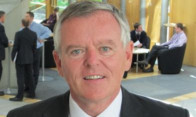
An independent Scotland risks becoming the “weak link” in the fight against terrorism.
A report by a panel of international experts which was leaked last night warned that should Scotland vote for independence next year it will struggle to maintain security.
And the panel questioned how independent a separate Scotland could be since it would still have to take orders from the UK and other powers in order to operate appropriate defences.
Pro-Union campaigners claim the country’s safety could be put at risk by “Alex Salmond’s obsession with independence”.
Their warning comes only a day after Professor Richard English, of St Andrew’s University, said co-operation between intelligence and justice agencies would be under threat if the UK broke up.
Just last week Prime Minister David Cameron said that all the countries of the UK remain a target for terrorists. He told a Brussels press conference: “There are lots of people in the world who want to do us harm.”
The panel of intelligence and security experts met in Edinburgh earlier this month.
Their seminar was the first in a series of meetings organised by the European Security Research Council into the effects of Scots independence.
As well as international academics, the event involved civil servants, researchers and former spies.
The leaked report is clear that independence would carry significant dangers.
It points to the “daily support” that Scotland’s current counter-terrorism units receive from their UK counterparts.
It warns: “Security governance feels different and is different in Scotland, but it is not independent of the UK.
“Independence would mean either creating new Scottish agencies to replace the loss of support from those based in England, or somehow continuing to work with the old agencies. Neither option would be straightforward.”
The experts, led by Edinburgh University academic Dr Andrew Neal, raised the prospect of a Scottish MI5 that would have just 300 staff to protect the nation.
And they explained that Scotland would face a heavy financial burden to maintain the encryption and security systems required to be part of current intelligence arrangements with the US, Australia, Canada and New Zealand.
They added: “Any new arrangements would be politically sensitive because Scotland would not want to be accused of being a weak link.’”
Former senior police officer and Director of the Scottish Crime and Drug Enforcement Agency Graeme Pearson MSP said: “It is clear that experts have real concerns about the security implications of breaking up the UK.
“The SNP can’t answer basic questions about what kind of intelligence and security service a separate Scotland would have, how much this would cost and whether we would enjoy the same level of security.
“From my experience as a police officer for over 35 years, developing effective working relationships with colleagues across the UK is far easier because we are part of the UK.
“As the experts make clear, breaking up the UK could have direct impact on the ability of Scottish police officers to do their job.”
However a Scottish Government spokeswoman dismissed the experts’ concerns.
She said: “These claims are wrong. An independent Scotland will have first rate security arrangements to counter any threats we may face.
“And we will continue to work in collaboration with the rest of the UK on security and intelligence matters,”

Enjoy the convenience of having The Sunday Post delivered as a digital ePaper straight to your smartphone, tablet or computer.
Subscribe for only £5.49 a month and enjoy all the benefits of the printed paper as a digital replica.
Subscribe